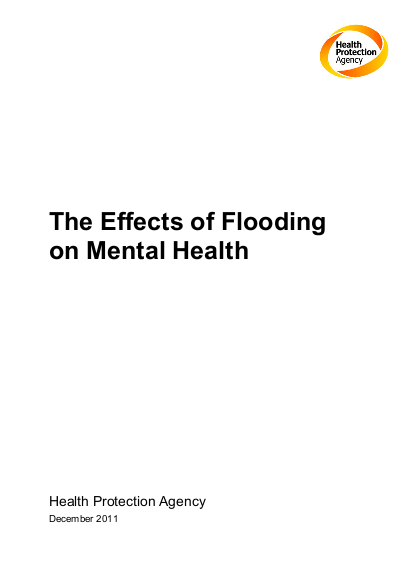
The effects of flooding and disasters on people‘s health, relationships and welfare can be extensive and significant. Flooding can have profound effects on people‘s welfare, employment, mobility, wellbeing, psychosocial resilience, relationships and mental health. It can pose huge social and welfare problems that may continue over extended periods of time because of not only being flooded (the primary stressor), but also because of the continuing secondary stressors that arise as people try to recover their lives, property and relationships. This report is borne out of a publication in 2009 from the Department of Health - New Horizons: a shared vision of mental health. Its vision states that mental health problems are common as are mental disorders that spring from environmental as well as physical and social risks. One of these environmental risks is posed by disasters, and they include flooding. As part of the work for New Horizons, the Department of Health asked the Health Protection Agency to research systematically the public mental health impacts of flooding, synthesise best practice on their mitigation, and identify where research can support future evidence-based guidance. Since then, the present government has published No Health Without Mental Health: a cross-government mental health outcomes strategy for people of all ages (2011). That current government policy recognises the importance of psychosocial resilience and is particularly pertinent to this report and aspects of it are summarised in the first chapter. This report reviews the evidence on mental health and flooding. It complements the interim strategic guidance published by the Department of Health in 2009 – National Health Service Emergency Planning Guidance: planning for the psychosocial and mental health care of people affected by major incidents and disasters. That guidance remains contemporary. This document provides: An analytical review of current epidemiological studies related to mental health and flooding; A synthesis of a wide range of national and international guidance; and An analysis of future research needs. The material presented here provides further evidence on the impacts of floods on public mental health as well as public health approaches for supporting responses by specialist mental health services within a wider public mental health framework.
The authors have collected evidence through a systematic review of the literature that has been published since 2004. It consists of published research data (including epidemiological, government and non-government data), and guidance published by the government for England and by NATO. Experts in the field have advised on research in press or in process as well as on other known sources of information. This report draws on, and complements approaches suggested in four recent, substantial documents: The Mental Health Strategy: No health without mental health (2011); The Public Health White Paper: Healthy lives, healthy people (2010); New Horizons: a shared vision for mental health (2009); and NHS Emergency Planning Guidance: Psychosocial and mental health care of people affected by major incidents and disasters: Interim national strategic guidance (2009).
